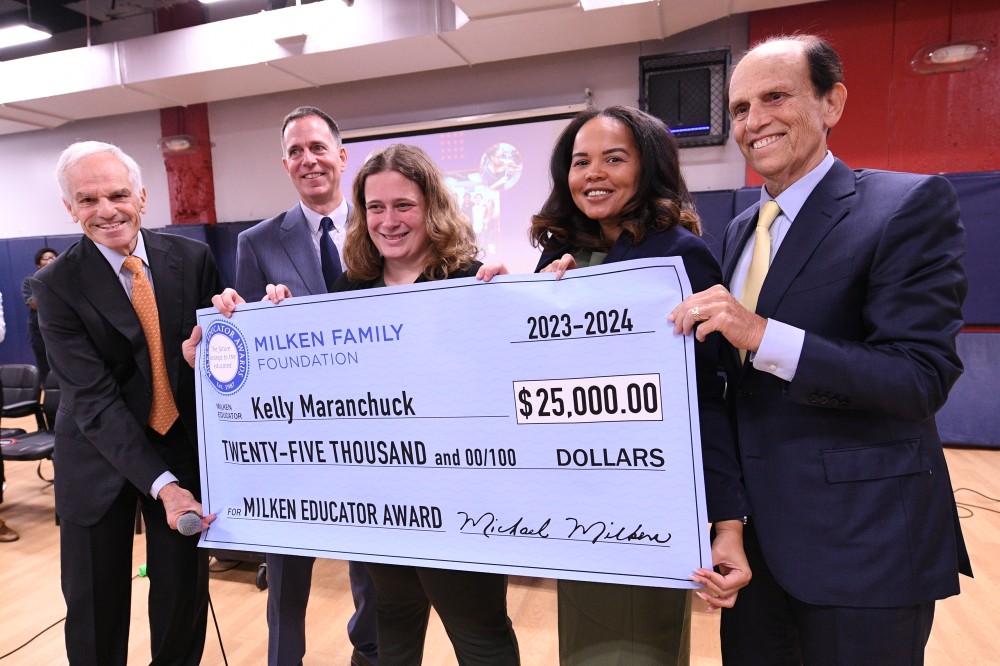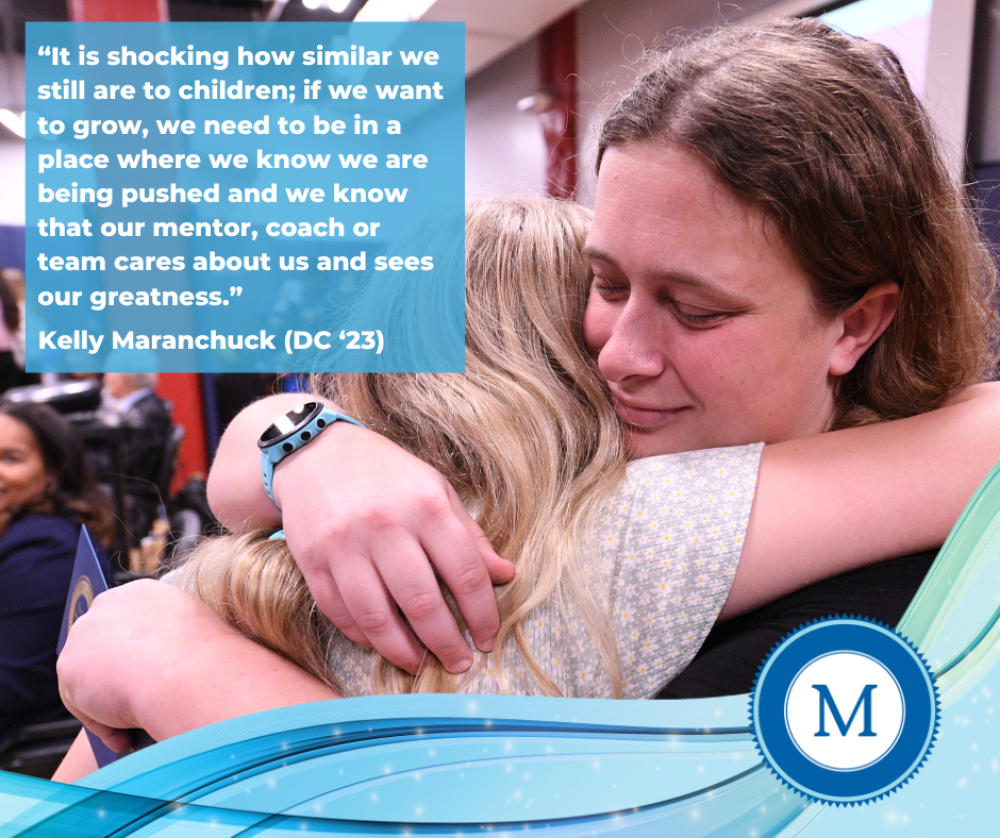Spotlight: Kelly Maranchuck (DC '23)
August 20, 2024
When she was a student, Washington, D.C., Milken Educator Kelly Maranchuck developed the nickname “Count Kelly” in AP U.S. History because teachers could always count on her for answers. This fueled Kelly’s confidence and made her feel valued in the classroom. Kelly fondly reflects on her educator role models because they created authentic relationships with their students and reinforced what made each of them unique. Now as a senior curriculum coordinator and instructional coach, Kelly focuses on cultivating a safe space and building authentic relationships with her own students. “It is shocking how similar we still are to children; if we want to grow, we need to be in a place where we know we are being pushed and we know that our mentor, coach or team cares about us and sees our greatness.” Kelly received a 2023-24 Washington, D.C., Milken Educator Award on November 6, 2023.
Milken Family Foundation: How have students responded since your Milken Educator Award surprise?
Kelly Maranchuck (DC '23): They’ve been very supportive and curious! Something I’ve always loved about our school community is how we encourage our students to ask questions. They didn’t hold back! They have really wanted to know more about what the award is and how I won it. The main question has been when I’m getting my money since I won the award back in November. A few students have asked if I could buy them Gucci or Coach purses. Besides the demands for purses, they have been really sweet. A few of my past students wrote me letters and cards to say congratulations; they’re hanging behind my desk now. My colleagues have also stepped up to help cover my normal duties while I’ve been learning about the Milken world, and that has been extremely appreciated.
MFF: Who are your role models as an educator?
Maranchuck: A lot of different people come to mind when I think about educator role models. I think about people like my AP U.S. History teacher, Mrs. Corso, or my third grade teacher, Mrs. Kleinman. They went out of their way to create authentic relationships with their students. Not just about how they did in class, but about what made each person unique. Mrs. Corso called me “Count Kelly” because she said she could always count on me for answers. As a shy and insecure teenager, that really helped make me feel like I was valued in her space. Mrs. Kleinman held me to high expectations throughout the year and kept class challenging but engaging. I borrowed a lot of her classroom management techniques when I stepped into the classroom myself! When I think about these teacher role models, I see them everywhere. They weren’t just in the classroom. They went to school musicals, sports, any event to show that they supported their students.
In terms of people who were mentors to me in my teaching career, the first person that pops into my head is Julia Pockros. She was my English department chair, and she always went above and beyond with her feedback. She always pushed me while reminding me that she cared, and that relationship was so critical when I started lead teaching. She always led her classroom so authentically and robustly where every second mattered. I also need to give a special shoutout to my old co-worker and dear friend, Shiosha McDonald. She was absolutely brilliant and would do everything in her power to differentiate learning so that it was accessible to every single kid in her classroom. Families all loved her, and she had a work ethic that exhausted me to even watch. She is a remarkable person; and I’m honored to be her friend and to have her as a bridesmaid this coming January!
MFF: Tell us about your first year of teaching.
Maranchuck: My first year of teaching was a nightmare. I didn't realize that I was interested in becoming a teacher until my senior year of college, so I signed up for a teaching residency master’s program. The program was supposed to have me learn under one mentor teacher, but I instead ended up becoming a substitute, aide, co-teacher, and pretty much anything the school needed me for. I don’t regret being thrown into education like that because I learned very quickly, but it was difficult. I understood how to develop a lesson, but I didn’t know anything else, especially about developing relationships with kids. I had to confront a lot of unconscious biases and learn how to approach each conversation with an intersectional awareness of a student’s forming identity. I wouldn’t have made it if brilliant teachers hadn’t pulled me under their wing and kept me afloat. I have always seen education as a profession where a strong community is so important. So, if anyone is reading this who is struggling as a first year teacher, I understand your pain! Learn from these lessons, rely on the people that care about you, and don’t give up!

MFF: What do you hope students remember from their time with you?
Maranchuck: I hope students remember that I cultivated a safe space where they felt like they were part of a community. I want them to feel that they had a teacher who cared about them and held high academic standards. I always wanted my students to feel like they were challenged, but that I always had their back.
MFF: How does your background teaching fifth grade English inform your work as a senior curriculum coordinator and instructional coach?
Maranchuck: Fifth grade is a really interesting age because it’s a time where the little humans cannot quite figure out if they want to still be a little kid, if they're ready to be a teenager or if it’s some grey area in between. It's a grade where you really have to hold rigorous standards and form strong cultural expectations. Teaching fifth grade for a few years made it essential to me that not a minute was wasted in my academic plans. It showed me how important it is that the kids know you care about them and that they care about you. This helped me as a curriculum coordinator because it has helped me navigate how to make an assessment schedule as feasible as possible for any grade level. As an instructional coach, it helped me form authentic relationships. It is shocking how similar we still are to children; if we want to grow, we need to be in a place where we know we are being pushed and we know that our mentor, coach or team cares about us and sees our greatness. It has to be a collaborative effort and for that to happen as both the curriculum coordinator and instructional coach, I need to set action-oriented steps that are accessible. I want to form an authentic relationship where we are constantly growing and working together towards a common goal. I'm always open to feedback and there's always space for things to be even better next time.
MFF: What advice would you share with people who are interested in becoming teachers?
Maranchuck: I would ask people who are interested in becoming teachers to think about why they want to be a teacher. Are they interested in certain academics? Are they interested in working with kids? What age of kids? I think a lot of people, myself included, come into education and don't have a clear "why," but you really need that "why" on the days where you've been grading for hours, you haven't slept, or a kid had a bad day so you had a bad day. You really need to have that strong foundation of why you want to get into this work because it is so important — and it isn’t easy. I would also advise anyone who wants to become a teacher to remember that they're not alone. In one lesson, I can think of tricks I've learned from about 10 different teachers that I admire and implemented. You’re not alone, we understand your struggle, and we are here for you.
MFF: Are you working on any interesting initiatives or new projects these days?
Maranchuck: I'm currently working on my referee certification for rugby, which you might think it has nothing to do with education, but it does! I'm of the firm belief that teaching should be a holistic practice and that it shouldn't be limited to growing students' minds academically, but they should be growing emotionally and physically. I think every kid can find some kind of physical activity that brings them joy.
Watch our interview with Kelly Maranchuck (DC '23) on the day of her Milken Award notification:
Don’t miss any new articles and updates from Milken Educator Awards:


